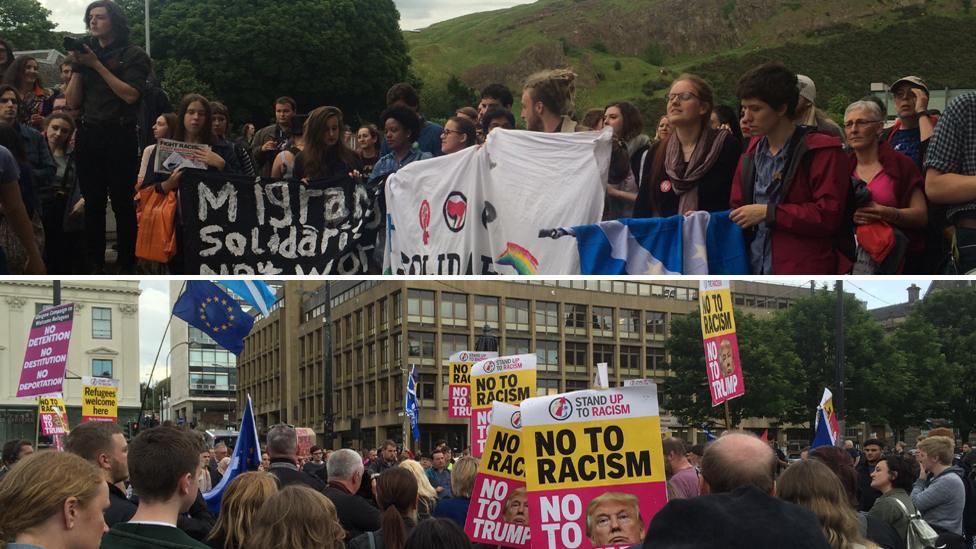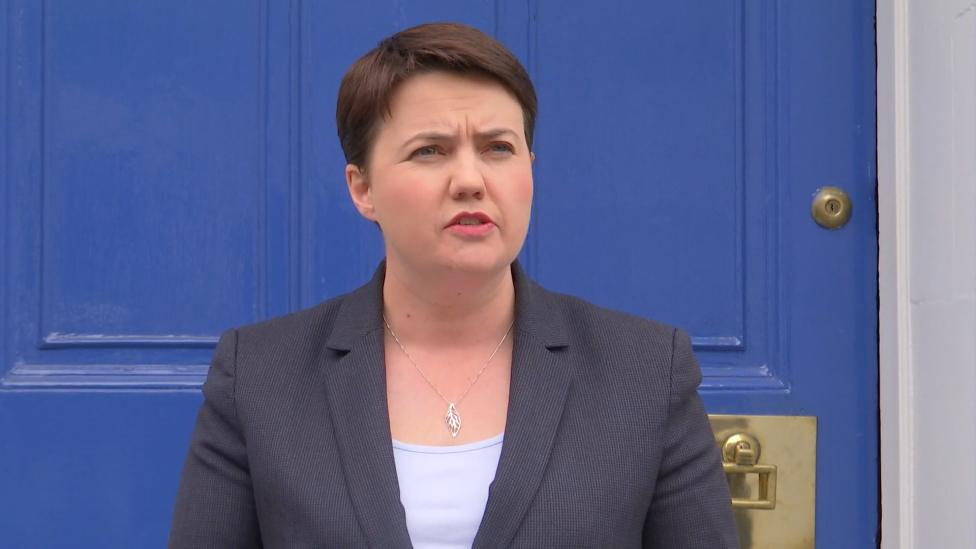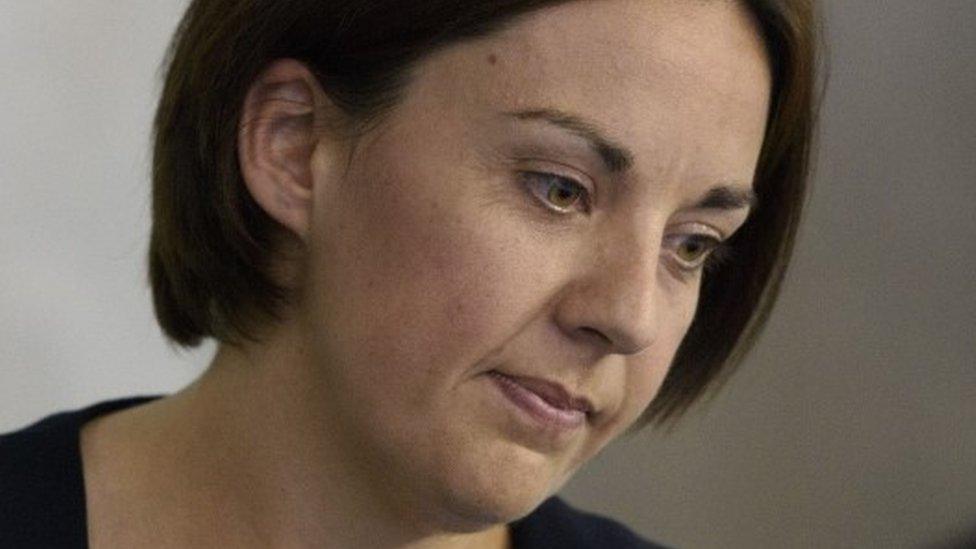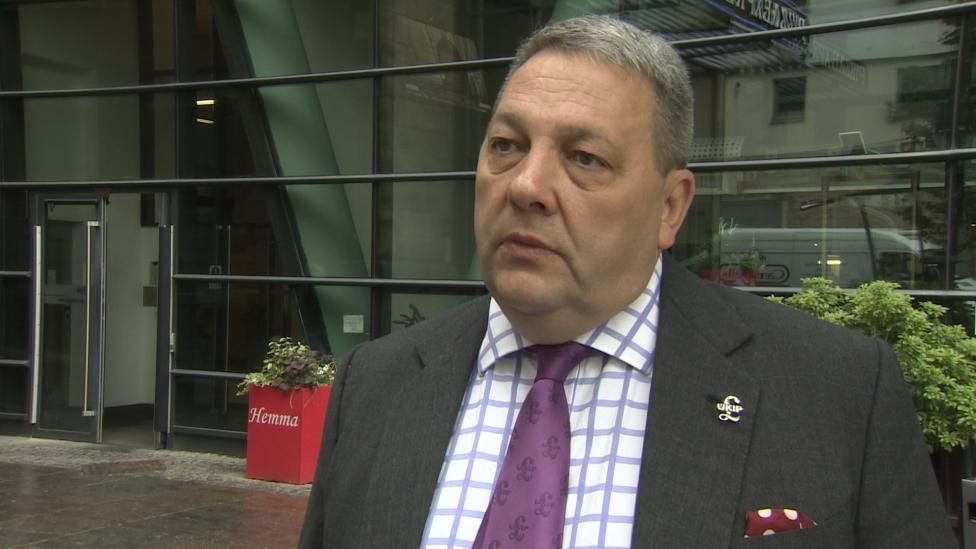Brexit: Nicola Sturgeon says second Scottish independence vote 'highly likely'
- Published
First Minister Nicola Sturgeon said a second independence referendum was "highly likely"
Scotland's first minister has said a second independence referendum is "highly likely" after the UK voted to leave the EU.
Nicola Sturgeon said it was "democratically unacceptable" that Scotland faced the prospect of being taken out of the EU against its will.
She said the Scottish government would begin preparing legislation to enable another independence vote.
Scotland voted in favour of the UK staying in the EU by 62% to 38%.
The UK as a whole has voted to leave, by a margin of 52% to 48%, prompting UK Prime Minister David Cameron to announce he would stand down by October.
The SNP manifesto for May's Holyrood elections said the Scottish Parliament should have the right to hold another referendum if there was a "significant and material change" in the circumstances that prevailed at the time of the 2014 referendum, such as Scotland being taken out of the EU against its will.
At a news conference in Edinburgh, Ms Sturgeon said: "It is, therefore, a statement of the obvious that a second referendum must be on the table, and it is on the table."

Is the time right for Indyref2? - BBC Scotland political editor Brian Taylor

It looks "highly likely", says Nicola Sturgeon, that there will now be a second referendum upon Scottish independence.
Is she enthused by this prospect? Does she thrill at the notion? Is she buffing up her best lines from 2014? The answers to those questions would be no, no and, once again, no.
To be clear, for the avoidance of any doubt, Nicola Sturgeon remains rather keen on the concept of Scottish independence. Indeed, she yearns for it.
She knows that means another referendum at some point in the future. But not now. Not in these circumstances. Not in these troubled times.

Ms Sturgeon said the Scottish cabinet would meet on Saturday and she would make a statement to MSPs on Tuesday.
The first minister said there was now a significant divergence between Scotland and the rest of Britain which she "deeply regretted".
A majority of voters in all 32 council areas in Scotland voted Remain.

Area-by-area in maps: See how people voted
Speaking at her official residence, Bute House, she said: "I intend to take all possible steps and explore all possible options to give effect to how people in Scotland voted - in other words to secure our continuing place in the EU, and in the single market in particular."
Asked if there were any other options available to the Scottish government, she replied: "I think an independence referendum is now highly likely but I also think it is important that we take time to consider all steps and have the discussions, not least to assess the response of the European Union to the vote that Scotland expressed yesterday."
She also revealed she had spoken to London Mayor Sadiq Khan since the result and that he shared, for London, the desire to remain in the EU. "There is clear common cause between us," she said.

How has Scotland reacted to the Brexit vote?

People gathered in Edinburgh and Glasgow to demonstrate against the result and show support for migrants
BBC Scotland took to the streets of towns and cities across the country to find out what people felt about the decision to leave the EU.

Ms Sturgeon said: "After a campaign that has been characterised in the rest of the UK by fear and hate, my priority in the days, weeks and months ahead will be to act at all times in the best interests of Scotland and in a way that unites, not divides us.
"Let me be clear about this. Whatever happens as a result of this outcome, England, Wales and Northern Ireland will always be Scotland's closest neighbours and our best friends - nothing will change that.
"But I want to leave no-one in any doubt about this. I am proud of Scotland and how we voted yesterday.
"We proved that we are a modern, outward looking and inclusive country and we said clearly that we do not want to leave the European Union.
"I am determine to do what it takes to make sure these aspirations are realised."

Ms Davidson said she believed in Scotland's place within the United Kingdom "today as much as ever"

Kezia Dugdale said the country did not need "more turmoil, more upheaval and more economic chaos"
Scottish Conservative leader Ruth Davidson said she shared Ms Sturgeon's disappointment at the result - but she did not believe it justified holding another independence referendum.
In a statement she said: "Like the first minister I want to see stability prioritised in the days ahead. Scotland will open for business next week in the same way as it closes today.
"But I do not believe that a second independence referendum will help us achieve that stability nor that it is in the best interests of the people of Scotland."
Ms Davidson added that addressing the challenges of leaving the EU should not mean "leaving our own Union of nations".
She said she believed in Scotland's place within the UK "today as much as ever."
'Time for calmness'
Scottish Labour Leader Kezia Dugdale said the result was bad for jobs and the economy in Scotland and across the UK.
She added that she would be ready to work with Ms Sturgeon in the "best interests of the people of Scotland".
However, Ms Dugdale said she did not want to see a second Scottish independence referendum.
She explained: "On the question of independence, many of the fundamental questions that were unresolved and unanswered in 2014, remain so. Not least the question of currency. What we don't need today is more turmoil, more upheaval and more economic chaos."
Secretary of State for Scotland, David Mundell, said he would meet the Scottish government to ensure it was "fully involved" in negotiations surrounding the UK's withdrawal from the EU.
Responding to suggestions that the result could trigger a second independence referendum, he said now was "a time for calmness and deliberation, not pushing other personal or political agendas".

David Coburn said Nicola Sturgeon's talk of another referendum was "nonsense"
Scotland's only UKIP MEP David Coburn said it was "fantastic" that "we're out".
He added: "Whatever nonsense Nicola is coming out with, all this nonsense of another referendum, another neverendum - she's talking through her hat - because 40% of the population don't want anything to do with the EU."
Scottish Liberal Democrat leader Willie Rennie said he was "angry that we have lost our place in Europe".
He said: "It is bad for our country and the people who live here. It means cutting our ties with our biggest economic market despite the consequences for trade, business, jobs and incomes."
Scottish Green co-convenor Patrick Harvie said Scotland "must keep open every option for protecting ourselves from this threat".